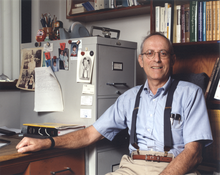Irwin Fridovich | |
|---|---|
 | |
| Born | August 2, 1929 New York City, New York, U.S. |
| Died | November 2, 2019 (aged 90) |
| Alma mater | City College of New York (BS 1951), Duke University (PhD 1955) |
| Known for | Superoxide dismutase, oxygen free radicals |
| Awards | Elliott Cresson Medal (1997) |
| Scientific career | |
| Fields | Biochemistry |
| Institutions | Cornell Medical College, Duke University |
| Doctoral advisor | Philip Handler |
| Doctoral students | Joe M. McCord, Hara P. Misra |

Irwin Fridovich (August 2, 1929 – November 2, 2019)[1] was an American biochemist who, together with his graduate student Joe M. McCord, discovered the enzymatic activity of copper-zinc superoxide dismutase (SOD),[2][3]—to protect organisms from the toxic effects of superoxide free radicals formed as a byproduct of normal oxygen metabolism.[4] Subsequently, Fridovich's research group also discovered the manganese-containing[5] and the iron-containing[6] SODs from Escherichia coli and the mitochondrial MnSOD (SOD2),[7] now known to be an essential protein in mammals.[8] He spent the rest of his career studying the biochemical mechanisms of SOD and of biological superoxide toxicity, using bacteria as model systems.[9][10][11] Fridovich was also Professor Emeritus of Biochemistry at Duke University.
- ^ "Duke Flags Lowered: Biochemist Irwin Fridovich Dies at Age 90".
- ^ McCord JM, Fridovich I (1969). "Superoxide Dismutase, An Enzymic Function for Erythrocuprein (Hemocuprein)". Journal of Biological Chemistry. 244 (22): 6049–6055. doi:10.1016/S0021-9258(18)63504-5. PMID 5389100.
- ^ Fridovich I (1998). "The trail to superoxide dismutase". Protein Science. 7 (12): 2688–2690. doi:10.1002/pro.5560071225. PMC 2143889. PMID 9865966.
- ^ Bannister WH, Bannister JV (1988). "Isolation and characterization of superoxide dismutase: a personal history and tribute to Joe McCord and Irwin Fridovich". Free Radical Biology and Medicine. 5 (5–6): 371–6. doi:10.1016/0891-5849(88)90110-4. PMID 2855737.
- ^ BB Keele Jr; JM McCord; I Fridovich (1970). "Superoxide Dismutase from Escherichia coli B: A new manganese-containing enzyme". Journal of Biological Chemistry. 245 (22): 6176–6181. doi:10.1016/S0021-9258(18)62675-4. PMID 4921969.
- ^ FJ Yost Jr; I Fridovich (1973). "An iron-containing superoxide dismutase from Escherichia coli". Journal of Biological Chemistry. 248 (14): 4905–4908. doi:10.1016/S0021-9258(19)43649-1. PMID 4352182.
- ^ Weisiger RA, Fridovich I (1973). "Superoxide Dismutase: Organelle specificity". Journal of Biological Chemistry. 248 (10): 3582–3592. doi:10.1016/S0021-9258(19)43969-0. PMID 4702877.
- ^ McCord JM, Fridovich I (1988). "Superoxide dismutase: the first twenty years (1968-1988)". Free Radical Biology and Medicine. 5 (5–6): 363–9. doi:10.1016/0891-5849(88)90109-8. PMID 2855736.
- ^ Fridovich I (1978). "The biology of oxygen radicals". Science. 201 (4359): 875–880. Bibcode:1978Sci...201..875F. doi:10.1126/science.210504. PMID 210504.
- ^ Fridovich I (1995). "Superoxide radical and superoxide dismutases" (PDF). Annual Review of Biochemistry. 64: 97–112. doi:10.1146/annurev.bi.64.070195.000525. PMID 7574505. S2CID 26834871. Archived from the original (PDF) on 2019-03-06.
- ^ Kresge N, Simoni RD, Hill RL (2006). "Forty Years of Superoxide Dismutase Research: the Work of Irwin Fridovich (JBC Classics: Enzymology)". The Journal of Biological Chemistry. 281 (22): e17. doi:10.1016/S0021-9258(20)56010-9. Retrieved July 3, 2011.
{{cite journal}}: CS1 maint: multiple names: authors list (link)